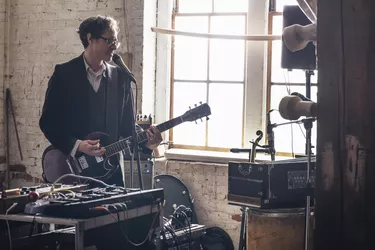
A working musician in today's world typically draws his salary from a variety of jobs including, but not limited to, live performances, teaching, transcribing and arranging, and often from studio recording. His salary varies greatly depending on his level of training, experience, location, and the number of studio recording sessions for which he is hired. Some musicians can even make a living from studio sessions alone, but for most it is only a percentage of their income. The Bureau of Labor Statistics reported an average musician salary of $41.46 an hour in May 2021.
Average Musician Salary by Location
Video of the Day
To have success on your job search as a studio musician, you need to be in a city that not only has a decent number of recording studios but also a reasonable number of commercial and professional music endeavors. It is no surprise that the most active communities in the United States for studio musicians are (and have been for a while) New York City, Los Angeles and Nashville. However, studio musicians can also find work in virtually any city with a population of 400,000 or more.
Video of the Day
The top-paying states in the United States for studio musicians were Ohio, California, New York, Virginia and Connecticut in 2021. Average wages in these locations ranged between $48.53 and $54.09 an hour, according to May 2021 data from the BLS.
Types of Studio Session Work
The May 2021 BLS data showed that musicians who worked for performing arts companies made an average hourly wage of $44.27, while those working in the sound recording industries averaged $44.54 hourly.
Most large cities in the U.S. have more than one firm or business that regularly records commercial music such as jingles, commercials and radio programs. Most of them have a standard list of studio musicians to call on, so you can keep this in mind when creating your studio musician career plan.
Another very common job for studio musicians is to record with a solo artist. These jobs are typically obtained through word of mouth or through social networking sites. Other projects are simply artistic collaborations, although these roles are often unpaid.
Studio Session Musician Rates
Most studio musicians set their own rates and often charge by the hour, and the amount can highly vary. For example, you might charge $25 an hour or several hundreds of dollars per hour. Another common method of payment calculation is to charge per song. In that case, you might set a rate such as $50 per song or even $1,000 per song. A third and slightly less common approach is to quote a set price for the whole recording session, but this is often calculated based on the number of songs or hours the musician will spend on the project.
A third and slightly less common approach is to quote a set price for the whole recording session. This is often calculated based on the number of songs or hours the musician will spend on the project.
Some studio musicians who charge by the hour or per song also require a minimum payment such as the equivalent of four hours of recording or four songs. This helps ensure you have some more stability and predictability for your income.
Charging Based on Credentials
No objective method exists to define what a studio musician should make. However, a session player can justify his rates based on training, such as a college music degree, and experience. The BLS suggests making yourself known in the area and honing your skills can benefit you financially as a studio musician. For example, you might opt for musician courses on a site like Udemy.